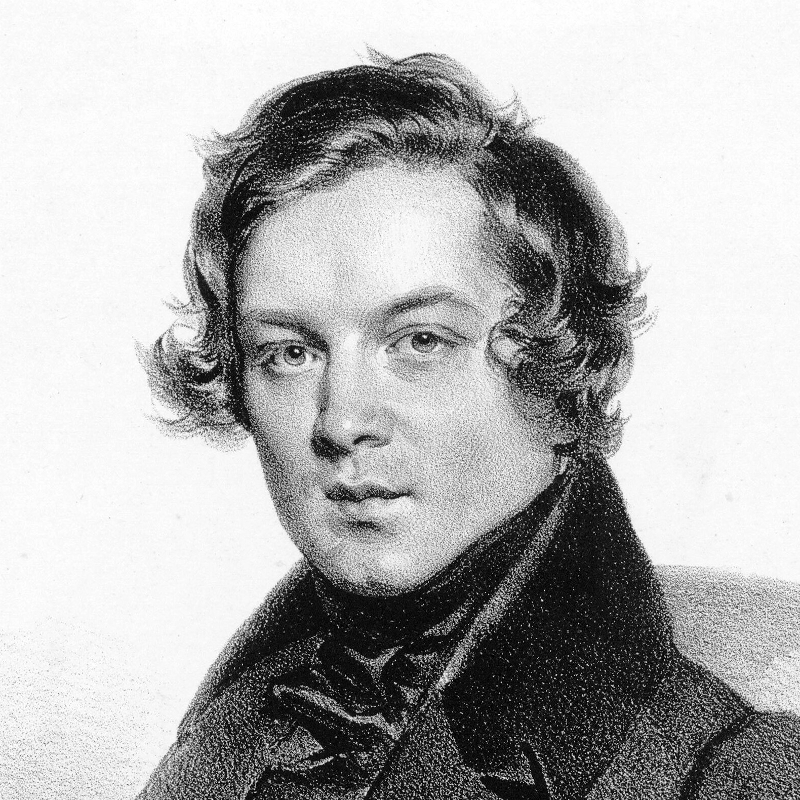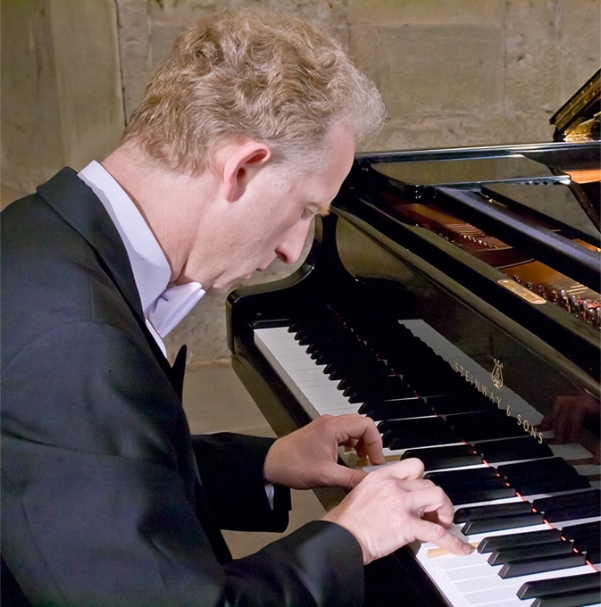SCHUMANN: Carnaval for Piano, Op. 9 "Little Scenes on Four Notes"
Track
Carnaval for Piano, Op. 9
"Little Scenes on Four Notes"
Performed by Rolf Plagge (Piano)
A live recording from the German
UNESCO World Heritage Site Maulbronn Monastery
Concert Grand Piano: C-227 by Steinway & Sons
DDD · Duration: 31 Min. 35 Sec.
Digital Music Album [here: MP3/320kBit/sec.] · 12 Tracks
MP3 Album
320 kBit/sec.



C
arnaval, Op. 9, is a work by Robert Schumann for piano solo, written in 1834-1835, and subtitled "Scènes mignonnes sur quatre notes" (Little Scenes on Four Notes). It consists of 21 short pieces representing masked revelers at Carnival, a festival before Lent. Schumann gives musical expression to himself, his friends and colleagues, and characters from improvised Italian comedy (commedia dell'arte). He dedicated the work to the violinist Karol Lipinski. Carnaval had its origin in a set of variations on a "Sehnsuchtswalzer" by Franz Schubert, whose music Schumann had only discovered in 1827. The catalyst for writing the variations may have been a work for piano and orchestra by Schumann's close friend Ludwig Schuncke, a set of variations on the same Schubert theme. Schumann felt that Schuncke's heroic treatment was an inappropriate reflection of the tender nature of the Schubert piece, so he set out to approach his variations in a more intimate way, and worked on them in 1833 and 1834. The work was never completed, however, and Schuncke died in December 1834, but Schumann did re-use the opening 24 measures for the opening of Carnaval. Pianist Andreas Boyde has since reconstructed the original set of variations from Schumann's manuscript (published by Hofmeister Musikverlag), premiered this reconstruction in New York and recorded it for Athene Records...

I
n July 1990 Rolf Plagge became the first German pianist ever to win a prize in the prestigious Moscow Tchaikovsky Competition. He had already been awarded numerous prizes in national and international competitions in Vienna, Bratislava, Montevideo, Bonn, and several times in Italy. In 1987 he won the 3rd prize in the esteemed 'Reine Elisabeth' Competition in Brussels and has since been a frequent performer in Belgium. Rolf Plagge is regularly performing in many European countries, including Russia, as well as in the US and Latin America, Japan, South Korea, South East Asia, Australia. Apart from giving solo performances with various German orchestras (State Symphony Orchestra of Thuringia, Bochum Symphonic Orchestra, Bremen Philharmonic, Munich Chamber Orchestra, Rheinische Philharmonie, Staatsphilharmonie Rheinland-Pfalz etc.) as well as with international orchestras, including Baltic Philharmonic, Filharmonia Narodowa Warschau, Orchestre National de France; Polish Chamber Philharmonic, Salt Lake City Symphony Orchestra, Israel Sinfonietta, Orchstre National de Belgique etc.
Plagge was born in 1959 in Westerstede, North Germany, where he received his first piano lessons at home. By 1969 he was studying at the Bremen Conservatory with Prof. Peter-Jürgen Hofer. After winning several prizes and scholarships he continued his studies with various famous teachers: in Freiburg with Vitaly Margulis, in Vienna with Paul Badura-Skoda, at the Juilliard School in New York with Gyorgy Sandor and finally in Hannover with Karlheinz Kämmerling. Since 1991 he is holding a teaching position as professor at the University of Music "Mozarteum" in Salzburg, also giving piano masterclasses in Europe and many other countries, including US, South America, Japan, Korea, Australia.
P
ublishing Authentic Classical Concerts entails for us capturing and recording outstanding performances and concerts for posterity. The performers, audience, opus and room enter into an intimate dialogue that in its form and expression, its atmosphere, is unique and unrepeatable. It is our aim, the philosophy of our house, to enable the listener to acutely experience every facet of this symbiosis, the intensity of the performance, so we record the concerts in direct 2-Track Stereo digital HD. The results are unparalleled interpretations of musical and literary works, simply - audiophile snapshots of permanent value. Flourishing culture, enthralling the audience and last but not least also you the listener, are the values we endeavor to document in our editions and series.
The concerts at the UNESCO World Heritage Maulbronn Monastery supply the ideal conditions for our aspirations. It is, above all, the atmosphere of the romantic, candle-lit arches, the magic of the monastery in its unadulterated sublime presence and tranquillity that impresses itself upon the performers and audience of these concerts. Renowned soloists and ensembles from the international arena repeatedly welcome the opportunity to appear here - enjoying the unparalleled acoustic and architectural beauty of this World Heritage Site, providing exquisite performances of secular and sacred music, documented by us in our Maulbronn Monastery Edition.
The concert grand piano is incontestably the king of instruments. We could now wax lyrical about its incomparable dynamics and go into its ability to go from the tenderest of sounds in a soft minor key to the magnificent power of a fortissimo, or I could rhapsodise about its impressive size and elegance. But what makes this instrument really fascinating is its individuality, since each one is unique in itself - created by a master. A concert grand has a life all of its own that a virtuoso can really "get into" and hence bring the work of the composer to life. In our Grand Piano Masters Series, we get into the character and soul of the concert grand piano and experience, during the performance itself, the dialogue between the instrument, the virtuoso and the performance space.
Andreas Otto Grimminger & Josef-Stefan Kindler, K&K Verlagsanstalt





Another great piano recital from K&K...This is a special one!
28. December 2012 - 19:44 — kuk-art.comAnother great piano recital from K&K... His easy virtuosity leaves him free to voice the chords at every moment, and there are many moments of sheer magic in all the chosen works. I would mention, for example, his compelling interpretation of one of the most elusive and problematic of Schubert's sonatas, the first movement thoughtfully dramatic, and the slow movement exquisite... This release is a special one!
Peter Grahame Woolf, Musical Pointers UK